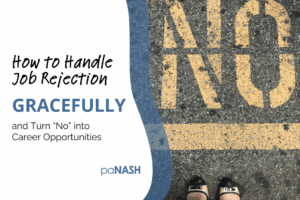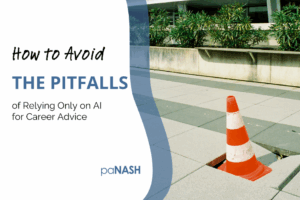|
|
One question I often get from my mid-career clients wanting to make a career change is,
“Should I go back to school?”
You might expect someone who previously worked in higher education and who’s a huge fan of lifelong learning to enthusiastically respond with, “Yes!” However, this is not my typical response.
Instead, I respond with,
“Is it necessary for your career goal?”
If you don’t know your career goal yet, then you can’t answer this question. Therefore, my first order of business is to help you figure out what’s next for you.
Once you know what you want to do, then we need to determine if taking the plunge into a new degree program is necessary for your goal.
Are the educational qualifications required, or just preferred?
Does the job you’re now targeting require a degree or coursework you don’t have? Make sure you read the job description carefully. Don’t confuse the word “required” with “preferred.”
For example, if the majority of the job ads for the type of job you’re targeting typically requires a 4-year degree but prefers a master’s, you probably don’t need to rush back to school for the master’s and get yourself in more debt.
If you already have the required 4-year degree along with a substantial amount of experience (at least 5-10 years), you’re likely a qualified candidate. Especially if the master’s is about the only thing you’re lacking from the listed qualifications.
Employers typically put more stock into your experience and skills than they do your education. Think about it. If you’re mid-career, when was the last time someone asked you in an interview what your college GPA was? But they probably asked you about your skills and experience instead, right?
And if there are still a couple skills you’re lacking from the job ad, determine if those are skills you could learn quickly and easily through some online courses or tutorials.
However, if the job ad says an advanced degree is required, then you will need to go back to school.
Educational alternatives
Certification programs and boot camps
Let’s assume you’re making a career change and you’re going to have to learn some new skills. Before committing to a lengthy and expensive degree program, find out if the educational requirement can be satisfied with a short-term intensive certification program.
Perhaps you can satisfy the educational requirement with a 12 to 24-week certification program or a 10-month boot camp. These alternatives are sometimes offered online and part-time so you can continue working your current full-time job while attending. There are numerous options like this which serve as an alternative to going back to school full-time.
Beware though when you begin searching for certification programs. There are a lot of certification programs out there that are just money-makers. The only value they add is giving you another line on your resume or more letters behind your name, but aren’t really necessary for compliance in your chosen field. You’ll want to make sure the certification is necessary for the type of job you want. Otherwise, you probably don’t want to spend your money on it.
Also, look for certification programs with a good reputation (like those offered by accredited universities). And look to see if they offer some type of career placement assistance. Before registering, talk to others who’ve completed the program. Get their thoughts of it and see if it has significantly boosted their careers. They will be able to tell you if it’s worth the time and money.
A few of my clients have made a successful career change to the field of coding by investing time and money in a reputable coding boot camp. One such client had no previous experience at all in coding. She landed a job a week before her graduation from the boot camp with a well-known company she’d always wanted to work for.
MOOCs
Another great alternative to a traditional degree program is MOOCs which stands for massive open online courses. They’re taught by professors from highly reputable universities such as Stanford, Princeton, and Duke. Others are taught by professionals from companies like Google and IBM.
These courses are delivered online and vary in costs. Some are free if you’re just wanting to learn something new for personal interest. Others have affordable rates allowing you to learn a new skill, prepare for a career change, or even earn a certificate or degree.
One of the best MOOCs sites is www.coursera.org. They offer over 4,000 courses in subjects such as business, computer science, arts & humanities, engineering, social sciences, and even personal development. I’ve taken a few interest courses myself on this site and really enjoyed the flexibility of it. Once I completed each course a badge was added to my LinkedIn profile.
Reading and Listening
Finally, you can still learn the old fashioned way through books. It’s been said that reading at least five books on one subject can bring you up to near-expert level on the subject.
If you don’t like to read, there’s no excuse! Many books are now available to listen to on Audible or other audio platforms. There are also numerous podcasts available for you to listen to and learn about new subjects.
Improve your job search skills
Sometimes going back to school isn’t the answer. Sometimes the answer is to get help in improving your job search skills.
I recently had a new client come to me thinking he needed to go back to school to get another degree in something else. He assumed this because he wasn’t having any luck with his job search in his current field.
I asked him if he was having trouble finding jobs to apply for. He said he’d applied for several but wasn’t getting many interviews. And when he did get interviews, he wasn’t getting any offers.
Since there were jobs available to apply for, the problem wasn’t a lack of demand. It was his approach to the job search, specifically his resume and interview skills.
Spending A LOT of money on another degree instead of a little money on some career coaching didn’t make sense. So he hired me to help him improve his job search skills.
I spent time giving him new and fresh approaches to networking, helping him tweak his resume, revealing his blind spots in his interview skills, and coaching him on how to improve in future interviews. It’s now up to him to apply what he’s learned from the coaching.
If he’d just gone back to school full-time for another degree program requiring two additional years of studies like he’d originally planned, he would not only be out the money he spent on tuition but also out the money he could’ve earned in those two years. Plus he’d be two years behind in salary increases.
Is going back to school worth it?
So is going back to school really worth it? Definitely not in the example described above. But you have to determine based on your own career goals if it’s worth it or not.
Make sure you take into consideration the following factors:
- Is it required or necessary to achieve your career goal?
- How much will it set you back in both time and money?
Also, consider how higher education has changed since you last attended college. Tuition has gone up while the quality of the programs have been watered down.
One client hired me after having started a master’s degree in a new field because she was extremely frustrated and disappointed with the lack of challenge from her classes. The rigor did not equal the amount she was paying in tuition. Therefore, she felt she wasn’t getting her money’s worth and wanted to find out what other options she had.
School vs. lifelong learning
The main reason to go back to school is if it’s absolutely necessary for your career goals. And you don’t want to go back to school simply because you don’t know what to do next.
However, this doesn’t mean you should ever stop learning! You always want to invest in yourself and stay relevant with lifelong learning. Start with some of the more affordable alternatives listed above. Doing so can help you better determine what you want to do next in your career, which will help you know if going back to school for another degree is really the answer.
Related posts
- Nobody Likes a Know-It-All. Be a Learn-It-All Instead!
- 5 Books That Will Make a Huge Impact on Your Life and Career
- From the Comfort Zone to the Learning Zone






